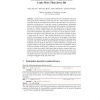Free Online Productivity Tools
i2Speak
i2Symbol
i2OCR
iTex2Img
iWeb2Print
iWeb2Shot
i2Type
iPdf2Split
iPdf2Merge
i2Bopomofo
i2Arabic
i2Style
i2Image
i2PDF
iLatex2Rtf
Sci2ools
115
click to vote
ESORICS
2008
Springer
2008
Springer
Termination-Insensitive Noninterference Leaks More Than Just a Bit
Current tools for analysing information flow in programs build upon ideas going back to Denning's work from the 70's. These systems enforce an imperfect notion of information flow which has become known as terminationinsensitive noninterference. Under this version of noninterference, information leaks are permitted if they are transmitted purely by the program's termination behaviour (i.e., whether it terminates or not). This imperfection is the price to pay for having a security condition which is relatively liberal (e.g. allowing whileloops whose termination may depend on the value of a secret) and easy to check. But what is the price exactly? We argue that, in the presence of output, the price is higher than the "one bit" often claimed informally in the literature, and effectively such programs can leak all of their secrets. In this paper we develop a definition of termination-insensitive noninterference suitable for reasoning about programs with outputs. We...
ESORICS 2008 | Information Flow | Program's Termination Behaviour | Security Privacy | Termination-insensitive Noninterference |
| Added | 19 Oct 2010 |
| Updated | 19 Oct 2010 |
| Type | Conference |
| Year | 2008 |
| Where | ESORICS |
| Authors | Aslan Askarov, Sebastian Hunt, Andrei Sabelfeld, David Sands |
Comments (0)

